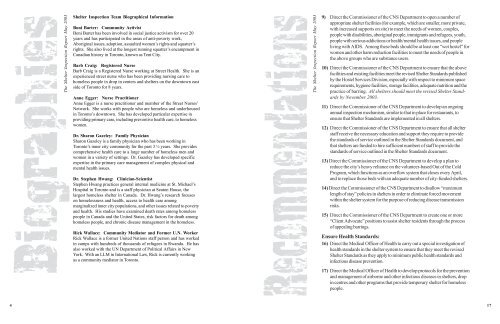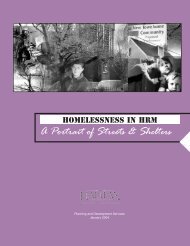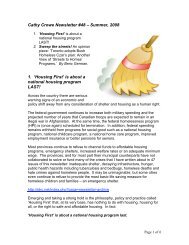Shelter Inspection Report - Toronto Disaster Relief Committee
Shelter Inspection Report - Toronto Disaster Relief Committee
Shelter Inspection Report - Toronto Disaster Relief Committee
Create successful ePaper yourself
Turn your PDF publications into a flip-book with our unique Google optimized e-Paper software.
Biographies<br />
The <strong>Shelter</strong> <strong>Inspection</strong> <strong>Report</strong> May 2003<br />
<strong>Shelter</strong> <strong>Inspection</strong> Team Biographical Information<br />
Boni Barter: Community Activist<br />
Boni Barter has been involved in social justice activism for over 20<br />
years and has participated in the areas of anti-poverty work,<br />
Aboriginal issues, adoption, assaulted women’s rights and squatter’s<br />
rights. She also lived at the longest running squatter’s encampment in<br />
Canadian history in <strong>Toronto</strong>, known as Tent City.<br />
Barb Craig: Registered Nurse<br />
Barb Craig is a Registered Nurse working at Street Health. She is an<br />
experienced street nurse who has been providing nursing care to<br />
homeless people in drop in centers and shelters on the downtown east<br />
side of <strong>Toronto</strong> for 8 years.<br />
Anne Egger: Nurse Practitioner<br />
Anne Egger is a nurse practitioner and member of the Street Nurses’<br />
Network. She works with people who are homeless and underhoused<br />
in <strong>Toronto</strong>’s downtown. She has developed particular expertise in<br />
providing primary care, including preventive health care, to homeless<br />
women.<br />
Dr. Sharon Gazeley: Family Physician<br />
Sharon Gazeley is a family physician who has been working in<br />
<strong>Toronto</strong>’s inner city community for the past 3 ½ years. She provides<br />
comprehensive health care to a large number of homeless men and<br />
women in a variety of settings. Dr. Gazeley has developed specific<br />
expertise in the primary care management of complex physical and<br />
mental health issues.<br />
Dr. Stephen Hwang: Clinician-Scientist<br />
Stephen Hwang practices general internal medicine at St. Michael’s<br />
Hospital in <strong>Toronto</strong> and is a staff physician at Seaton House, the<br />
largest homeless shelter in Canada. Dr. Hwang’s research focuses<br />
on homelessness and health, access to health care among<br />
marginalized inner city populations, and other issues related to poverty<br />
and health. His studies have examined death rates among homeless<br />
people in Canada and the United States, risk factors for death among<br />
homeless people, and chronic disease management in the homeless.<br />
Rick Wallace: Community Mediator and Former U.N. Worker<br />
Rick Wallace is a former United Nations staff person and has worked<br />
in camps with hundreds of thousands of refugees in Rwanda. He has<br />
also worked with the UN Department of Political Affairs in New<br />
York. With an LLM in International Law, Rick is currently working<br />
as a community mediator in <strong>Toronto</strong>.<br />
Recommendations<br />
The <strong>Shelter</strong> <strong>Inspection</strong> <strong>Report</strong> May 2003<br />
9) Direct the Commissioner of the CNS Department to open a number of<br />
appropriate shelter facilities (for example, which are smaller, more private,<br />
with increased supports on site) to meet the needs of women, couples,<br />
people with disabilities, aboriginal people, immigrants and refugees, youth,<br />
people with serious addictions or health/mental health issues, and people<br />
living with AIDS. Among these beds should be at least one “wet hostel” for<br />
women and other harm reduction facilities to meet the needs of people in<br />
the above groups who are substance users.<br />
10) Direct the Commissioner of the CNS Department to ensure that the above<br />
facilities and existing facilities meet the revised <strong>Shelter</strong> Standards published<br />
by the Hostel Services Division, especially with respect to minimum space<br />
requirements, hygiene facilities, storage facilities, adequate nutrition and the<br />
practice of barring. All shelters should meet the revised <strong>Shelter</strong> Standards<br />
by November 2003.<br />
11) Direct the Commissioner of the CNS Department to develop an ongoing<br />
annual inspection mechanism, similar to that in place for restaurants, to<br />
ensure that <strong>Shelter</strong> Standards are implemented in all shelters.<br />
12) Direct the Commissioner of the CNS Department to ensure that all shelter<br />
staff receive the necessary education and support they require to provide<br />
the standards of service outlined in the <strong>Shelter</strong> Standards document, and<br />
that shelters are funded to hire sufficient numbers of staff to provide the<br />
standards of service outlined in the <strong>Shelter</strong> Standards document.<br />
13) Direct the Commissioner of the CNS Department to develop a plan to<br />
reduce the city’s heavy reliance on the volunteer-based Out of the Cold<br />
Program, which functions as an overflow system that closes every April,<br />
and to replace those beds with an adequate number of city-funded shelters.<br />
14) Direct the Commissioner of the CNS Department to disallow “maximum<br />
length of stay” policies in shelters in order to eliminate forced movement<br />
within the shelter system for the purpose of reducing disease transmission<br />
risks.<br />
15) Direct the Commissioner of the CNS Department to create one or more<br />
“Client Advocate” positions to assist shelter residents through the process<br />
of appealing barrings.<br />
Ensure Health Standards:<br />
16) Direct the Medical Officer of Health to carry out a special investigation of<br />
health standards in the shelter system to ensure that they meet the revised<br />
<strong>Shelter</strong> Standards as they apply to minimum public health standards and<br />
infectious disease prevention.<br />
17) Direct the Medical Officer of Health to develop protocols for the prevention<br />
and management of airborne and other infectious diseases in shelters, drop<br />
in centres and other programs that provide temporary shelter for homeless<br />
people.<br />
4<br />
17







